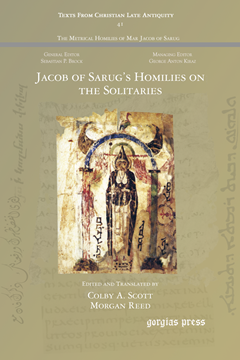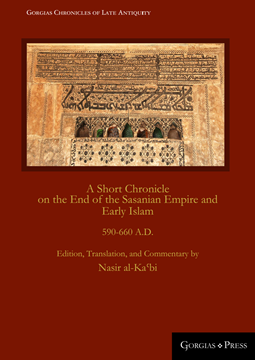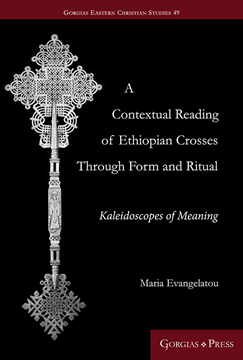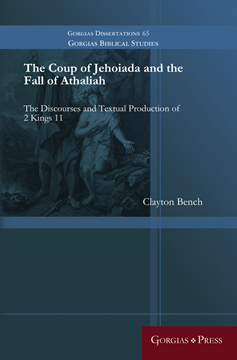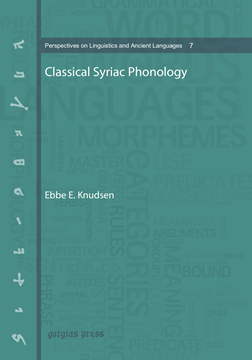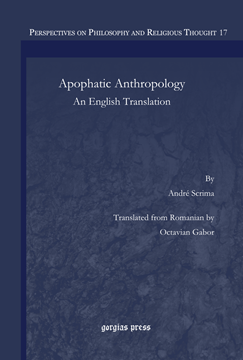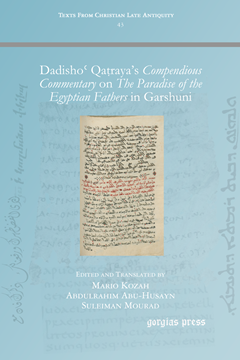Jacob of Sarug's Homily on the Lord's Prayer
Edited and Translated by Morgan Reed
Series: Texts from Christian Late Antiquity 42
ISBN: 978-1-4632-0561-4
Jacob of Sarug's pastoral concern and rhetorical acumen have earned him the title “the lyre of the Holy Spirit”. This volume presents both a text and translation of Jacob’s exposition of a passage central to Christian liturgy and piety.
$39.00 (USD) $23.40 (USD)
Jacob of Sarug's Homilies on the Solitaries
Edited and Translated by Colby A. Scott & Morgan Reed
Series: Texts from Christian Late Antiquity 41
ISBN: 978-1-4632-0562-1
Jacob of Sarug's pastoral concern and rhetorical acumen have appropriately earned him the title “the lyre of the Holy Spirit”. This volume presents Jacob's admonitions to those living a life of consecrated singleness to God.
$44.00 (USD) $26.40 (USD)
"It’s better to hear the rebuke of the wise than the song of fools" (Qoh 7:5)
Proceedings of the Midrash Section, Society of Biblical Literature, Volume 6
Edited by W. David Nelson & Rivka Ulmer
Series: Judaism in Context 18
ISBN: 978-1-4632-0560-7
This volume contains selected proceedings of the Midrash Section sessions convened during the 2012-2014 meetings of the Society of Biblical Literature. It is comprised of contributions by leading and emerging scholars that share a common focus on Rabbinic biblical interpretation as it intersects with a range of biblical texts and associated fields of study, including: Jewish legal literature; Hellenistic Judaism; post-biblical interpretation; biblical commentary; liturgical studies; and, cultural studies.
$169.00 (USD) $101.40 (USD)
A Short Chronicle on the End of the Sasanian Empire and Early Islam
590-660 A.D.
Edited and Translated by Nasir al-Ka'bi
Series: Gorgias Chronicles of Late Antiquity 1
ISBN: 978-1-4632-0563-8
The Short Chronicle is an eyewitness report on the demise of the Sasanian and Byzantines Empires and the beginning of the Islamic period. It uses official Sasanian sources and Syriac church documents and mentions for the first time new Arab cities, including Mosul, Kufa, and Baṣra.
$161.00 (USD) $96.60 (USD)
A Contextual Reading of Ethiopian Crosses through Form and Ritual
Kaleidoscopes of Meaning
Series: Gorgias Eastern Christian Studies 49
ISBN: 978-1-4632-0578-2
An exploration of the ways in which crosses reflect and shape ideas and practices in Ethiopian culture: from religious values and rituals to magic and apocalyptic beliefs, and from individual identities to socio-political structures and power relations.
$95.00 (USD) $57.00 (USD)
The Coup of Jehoiada and the Fall of Athaliah
The Discourses and Textual Production of 2 Kings 11
Series: Gorgias Biblical Studies 65
ISBN: 978-1-4632-0577-5
The Coup of Jehoiada and the Fall of Athaliah explores the discursive and historiographical techniques used to incorporate 2 Kings 11 into the larger deuteronomistic history. More specifically, this book explores how and why the report of Athaliah’s execution was not incorporated into the deuteronomistic history the same way as other Ahabite death reports found in 1 Kings 14 – 2 Kings 10.
$151.00 (USD) $90.60 (USD)
Classical Syriac Phonology
ISBN: 978-1-4632-0525-6
This book provides a description of Classical Syriac phonology based on fully vocalized biblical texts and the detailed comments by medieval Syriac grammarians. In addition to a description of Syriac consonants and vowels (including vowel quantity and stress), there are chapters on the compararive Semitic background of Syriac phonology and the grammatical features of the pre-classical inscriptions, and comparison with both eastern and western varieties of Jewish Aramaic. The modern dialect of Turoyo is also examined, and two appendices discuss the traditional pronunciation of West Syriac and the pronunciation of Modern Literary Syriac, and offer a sketch of Turoyo phonology.
$134.00 (USD) $80.40 (USD)
Apophatic Anthropology
An English Translation
By André Scrima; Translated by Octavian Gabor
ISBN: 978-1-4632-0565-2
An English translation of André Scrima's 1952 work on Apophatic Anthropology. Pascalian in essence, the approach departs from the Augustinian roots of Western Christian theology and develops a Christian anthropology based on Eastern Orthodoxy. The endeavor of a human being to understand oneself does not lead, as in the case of Pascal, to identification with Jesus Christ’s suffering, but further, to an attempt of deification, theosis, in which the main concept is Incarnation. This attempt opens to man the possibility to conceive himself as interior to God. Man becomes therefore the physical and metaphysical bridge between creation and the uncreated, the only creature that bears the image of God.
$147.00 (USD) $88.20 (USD)
Dadishoʿ Qaṭraya’s Compendious Commentary on The Paradise of the Egyptian Fathers
in Garshuni
Series: Texts from Christian Late Antiquity 43
ISBN: 978-1-4632-0566-9
The Compendious Commentary by the Church of the East monk Dadishoʿ Qaṭraya (7th cent.) was originally written in Syriac but was eventually translated into Garshuni or Syro-Arabic. It is a work aimed at immersing the novice monk in the spiritual lore of the monastic vocation, and saturating his mind and spirit with advice and warnings about the pitfalls of aiming to be perfect while remaining nevertheless an imperfect human being. This is a critical edition and translation of the Compendious Commentary in Garshuni that uses all available manuscripts.
$85.00 (USD) $51.00 (USD)
Hugoye - Journal of Syriac Studies (volume 17)
2014
General Editor George Anton Kiraz
Series: Hugoye: Journal of Syriac Studies 17
ISBN: 978-1-4632-0567-6
Widely regarded as a premier journal dedicated to the study of Syriac, Hugoye: Journal of Syriac Studies was established in 1998 as a venue devoted exclusively to the discipline. An organ of Beth Mardutho, the Syriac Institute, the journal appears semi-annually and will be printed in annual editions. A peer-reviewed journal, Hugoye is a respected academic source for up-to-date information about the state of Syriac studies and for discovering what is going on in the field. Contributors include some of the most respected names in the world of Syriac today.
$75.00 (USD) $45.00 (USD)

